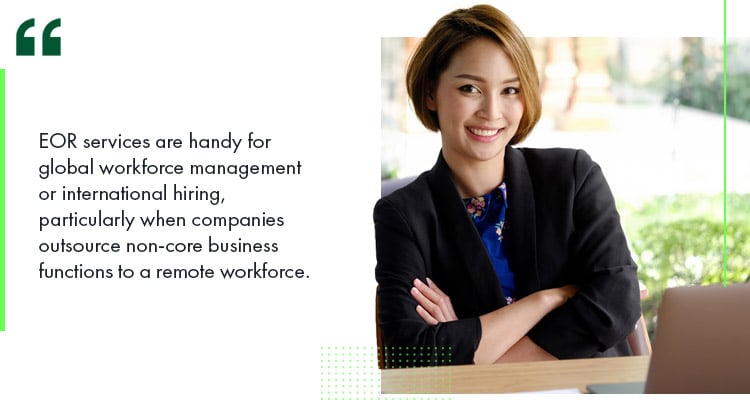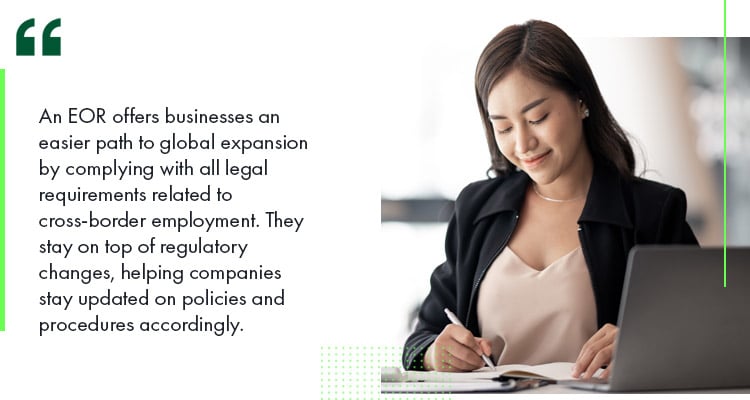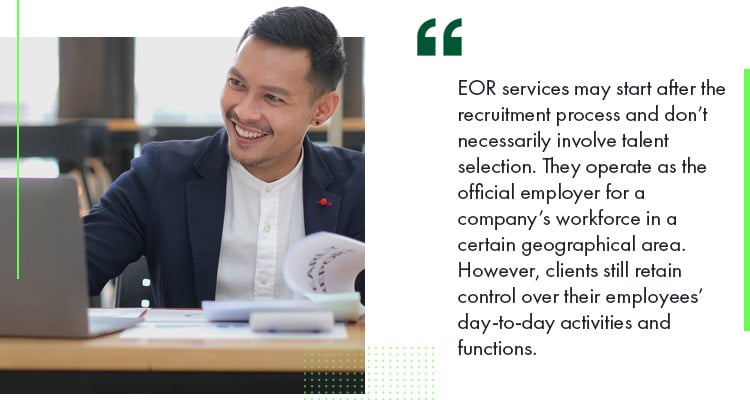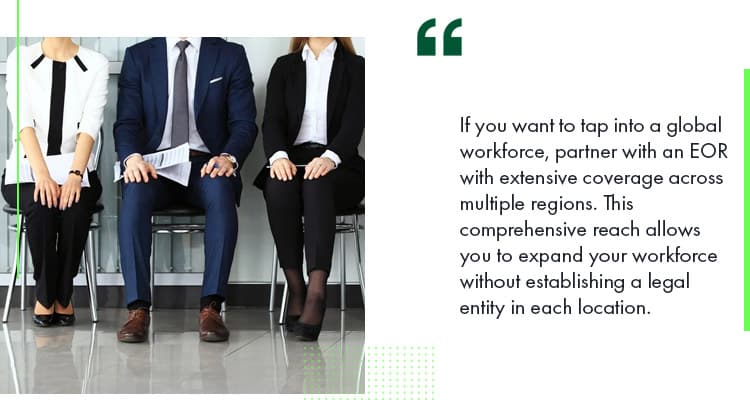Running a business involves financial planning, strategic direction, operational strategies, and growth projections. Additionally, it requires knowledge of legal compliance and obligations, particularly where employees are involved.
As such, many companies turn to an Employer of Record (EOR) to handle compliance matters, making global expansion easier. This article serves as a complete guide on what an EOR is, how it can benefit your business, and how it differs from other employment solutions.
Let’s take a closer look.
What is an Employer of Record (EOR)?
As its name suggests, an Employer of Record (EOR) employs workers on behalf of a company.
EOR services are handy for global workforce management or international hiring, particularly when companies outsource non-core business functions to a remote workforce.

These cover administrative and legal responsibilities including payroll compliance, employee benefits, tax compliance, and compliance with local labor laws. In essence, the EOR is the legal employer that takes care of:
- Employment contracts;
- Visa sponsorship;
- Work permits;
- Employee onboarding;
- Regulatory compliance;
- Labor law compliance
- Employee benefits administration;
- Other forms of HR compliance.
EOR services may also include the following:
- Global employment administration;
- Global employment compliance;
- Global employment outsourcing;
- Global employment management;
- Global employment solutions;
- Global employment support;
- Global HR administration;
- Global HR compliance;
- Global HR compliance administrative services;
- Global HR compliance management solutions;
- Global HR compliance provider services;
- Global HR compliance provider solutions;
- Global HR compliance outsourcing services;
- Global HR compliance solutions provider services;
- Global HR management solutions;
- Global HR outsourcing;
- Global HR services;
- Global HR solutions;
- Global HR support;
- Global payroll compliance; and
- Global payroll services.
Benefits of Using an EOR
An EOR takes care of complex and time-consuming tasks around managing talents abroad, allowing companies to focus on their core operations. This makes them ideal for businesses that want to expand and build an international workforce without the additional stress and hassle of establishing an entity in different countries.
The following are some benefits of using an EOR:
Simplified International Hiring
International staffing can be tricky as it requires complying with various laws and compliance regulations. Fortunately, an EOR serves as a bridge between companies and foreign employment regulations.
When a business decides to expand to other regions, an EOR acts as the legal employer of the members of the distributed teams for administrative purposes. Meanwhile, the clients maintain control over day-to-day operations and strategic decisions.
With this streamlined approach, you can quickly hire talents from different countries without the need to establish different legal entities abroad. This results in a smooth and painless hiring experience, making global talent acquisition easier.
Compliance and Risk Management
Different countries have varying labor laws, tax regulations, and employment standards. Hence, businesses operating across different regions may struggle to keep up.
It’s expensive and rigorous to comply with local labor laws, tax regulations, and payroll systems, especially when you’re looking into tapping the workforce in various countries.

An EOR offers businesses an easier path to global expansion by complying with all legal requirements related to cross-border employment. They stay on top of regulatory changes, helping companies stay updated on policies and procedures accordingly.
This proactive approach reduces the burden on the company’s internal resources. It also protects businesses from possible legal disputes and reputational damage associated with international employment.
Payroll and Benefits Management
Managing an international payroll can be challenging considering different tax systems, social security contributions, and other statutory requirements.
This is where an EOR comes in. They handle all matters pertaining to HR compliance and remote employee management like your employees’ health insurance, retirement plans, and other benefits mandated by various local laws or regulations.
An Employer of Record also:
- Provides in-depth guidance on local employment laws;
- Resolves discrepancies in pay, if any;
- Explains benefit options; and
- Assists in enrolment of health insurance or retirement plans.
By delegating these tasks to an EOR, companies can focus on their core operations and tap into global talent without worrying about administrative burdens and compliance risks.
Cost Efficiency
An international business expansion is costly. There are initial setup expenses, legal and regulatory compliance, and ongoing operational costs.
Additionally, understanding and adhering to the local legal and regulatory requirements can be frustratingly complex. Mistakes in these areas can lead to hefty fines and legal disputes, further increasing the cost of expansion.
EORs help you sidestep these by removing the need to set up a legal entity abroad so you can start operating immediately, reducing overhead costs and manpower requirements.
How Does an EOR Work?
EOR services may start after the recruitment process and don’t necessarily involve talent selection. They operate as the official employer for a company’s workforce in a certain geographical area. However, clients still retain control over their employees’ day-to-day activities and functions.

Here’s how it’s usually done:
Step #1: Contract Agreement
A contract agreement establishes your needs as well as the terms and conditions for an EOR-client company partnership.
The contract should specify the fees for payroll processing, tax compliance, employee monitoring, benefits administration, and adherence to local labor laws. It should also determine the types of employment contracts and benefits packages involved.
Most client companies also delegate some or most of these services to their EORs:
- International employee onboarding;
- International employee onboarding solutions;
- International employee management services;
- International employee management solutions;
- International HR administration;
- International HR compliance;
- International HR compliance management;
- International HR compliance management services;
- International HR compliance support services;
- International HR outsourcing;
- International HR management;
- International HR services;
- International HR support;
- International payroll administration;
- International payroll administration services;
- International payroll management;
- International payroll management services;
- International payroll services;
- International payroll support;
- International workforce management;
- International workforce management solutions; and
- International workforce solutions.
A clear contract lists down your EOR’s responsibilities, leading to a smooth partnership and a more efficient global talent acquisition process.
Step #2: Employee Onboarding
Once you finalise the contract, your EOR can start with employee onboarding.
The EOR will take over to collect all necessary documents from your staff in a certain location including their identification, tax forms, and other required paperwork. This step is crucial to ensure all legal and regulatory requirements are met, as these vary by country.
This comprehensive onboarding process integrates hires smoothly into your organisation while meeting all legal obligations in the process.
Step #3: Payroll and Benefits
An EOR will add your employees to their payroll and manage their taxes and benefits as required by local laws. Moreover, they educate employees about their health insurance, retirement plans, and other benefits.
EOR services cover the entire benefits process from enrolling employees in benefit programs to handling claims and answering questions. They stay up-to-date with local tax laws involving tax deductions, social security contributions, and other statutory requirements.
More importantly, they maintain accurate records and provide you with detailed reports such as payroll summaries, tax filings, and benefits usage.
By delegating workforce management solutions such as payroll, managed devices, benefits, you reduce the administrative burden on your team, boosting productivity and efficiency.
Step #4: Ongoing Support
As the legal employer, the EOR serves as the point of contact for any employee-related issues. They address HR-related matters and help maintain employee satisfaction.
Conversely, they handle exit paperwork and final pay calculations, making the transition easier for both the employee and the client company.
You can also rely on an Employer of Record to handle day-to-day administrative tasks such as:
- Managing employee records;
- Updating any changes in employment status; and
- Ensuring compliance with local labor laws.
Their on-going support provides you with enough data to make informed decisions about staffing, budgeting, and compliance strategies. Most of all, you can rely on them to handle all employee-related tasks with utmost efficiency and professionalism.
EOR vs. PEO: Understanding the Differences
A lot of people conflate an Employer of Record and a Professional Employer Organisation (PEO). While they offer similar advantages and services, they also have key distinctions:
Employer of Record (EOR)
An EOR takes several administrative tasks off your hands by:
- Becoming the Legal Employer – As the official employer of your remote workers, the EOR handles all employment responsibilities. They issue employment contracts, manage payrolls, withhold taxes, and administer benefits.
This setup lets you grow your global workforce without dealing with the complexities of regulations and compliance from wherever you may choose to hire talent.
- Amplifying Your Global Reach – An EOR is ideal if you want to hire employees in multiple countries without establishing local entities therein.
This way, you can tap into new markets without the logistical or legal challenges associated with establishing and maintaining local offices.
- Focusing on Compliance – EORs specialise in understanding and adhering to specific employment laws of each country where they operate.
This meticulous approach mitigates the risk of any legal liability for the client company.
Professional Employer Organisation (PEO)
In contrast, a PEO offers the following services:
- Co-Employment Model – An EOR is the legal employer on paper, while a PEO is just your co-employer.
This means you’re still legally responsible for your employees and the PEO is just there to support your HR functions. Thus, you should still provide any documents for legal or compliance requirements.
- Local Focus – PEOs typically operate within a single region. Thus, their scope only extends to local hires in that area.
If you want to hire from outside their jurisdiction, you would require an EOR.
- HR Outsourcing Services – PEOs are an outsourced HR department focusing on employee onboarding, performance reviews, contract termination, and other day-to-day HR services.
In summary, a PEO is a co-employer that supports your company’s HR responsibilities, but you remain the legal employer for compliance and legal issues. Therefore, a PEO is only recommended if you’re only hiring domestically.
Meanwhile, EOR services handle all employment-related tasks, enabling you to hire and manage an international team without the cost and hassle of setting up local entities in foreign countries.
Choosing the Right EOR for Your Business
Finding the right EOR for your team is a crucial decision.
It will determine how efficiently your business operates and how you’ll keep costs down. More importantly, it will affect your company’s ability to attract and retain top talents across different regions and countries.
Here are some of the things you need to look out for when choosing an EOR:
Tip #1: Check Their Geographical Coverage.
If you want to tap into a global workforce, partner with an EOR with extensive coverage across multiple regions. This comprehensive reach allows you to expand your workforce without establishing a legal entity in each location.

For instance, if you want to hire software developers in the Philippines, Korea, and India, consider partnering with an EOR that has strong coverage in these regions. This way, they can provide valuable insights into each talent market without the need to create local branches.
Tip #2: Look for Reputation and Experience.
A good EOR should have a proven track record and a solid reputation for managing international employees.
They should be able to navigate challenges efficiently, providing you valuable insights and suggestions on the best practices to keep the hiring process as smooth and painless as possible.
In addition, they should already have established processes for managing local employment regulations, tax laws, and employee benefits in the countries you’re considering hiring talents from.
Tip #3: Consider Their Cost Structure.
Before selecting an EOR, make sure their pricing aligns with your budget and business goals.
Typically, EORs charge fees based on the number of employees, the complexity of required services, and the geographic locations served. Be clear with your requirements and communicate these to your EOR.
Conversely, they should provide transparent costing, detailing the fees for payroll processing, benefits administration, compliance management, and other additional services, if any.
Tip #4: Check Their Customer Support.
Lastly, the right EOR should be very responsive to employee concerns.
Your liaison officer should be able to address concerns such as payroll issues, regulatory inquiries, and other similar concerns.
The EOR must also understand local laws and cultural nuances to mitigate disruptions, along with the competence and experience in handling sensitive HR matters.
FAQ
Here are some of the frequently asked questions about EOR services:
Question #1: Why Should I Use an EOR?
An EOR is a strategic remote work enablement model. Basically, it simplifies the process of hiring employees in different countries.
This means that you can focus on offshore staffing without worrying about employee relocation and other intricacies that come with international employment. This allows your company to expand its international workforce more efficiently.
Overall, an EOR acts as an international workforce management provider that helps you navigate cultural differences and labor market nuances.
Question #2: Can an EOR Handle Both Full-Time and Part-Time Employees?
Yes! An EOR handles payroll, benefits, tax compliance, and legal issues for your international staff, whether they’re full-time, part-time, contractors, temporary staff, and remote workers.
Moreover, they stay up-to-date with local labor laws to ensure employment agreements meet local standards. This helps businesses navigate complex regulations and maintain lawful operations in different regions.
Question #3: Is Using an EOR Cost-Effective?
Whether you need an international employee management provider or an international HR compliance support provider, an EOR is the right way to go.
It’s a cost-effective way to get the best talent available anywhere without having to set up a local entity in each foreign country.
Moreover, EORs have the expertise for navigating local regulations and employment practices to ensure smooth operations. With the right EOR, you can reduce the financial and operational burdens typically associated with global expansion.
Partnering With the Right EOR
The right EOR can take administrative and legal burdens off your plate, allowing you to focus on growing your business by hiring the best talent from all over the world.
Whether you’re a small business venturing into new markets or a large enterprise seeking to streamline your global workforce, an EOR can help ensure a successful international expansion.
Looking for AI prompts to streamline business functions? Click here.
Learn how to save and maximise on taxes through this guide.
Ready to partner with the right EOR? Click here.
Check out our 1,000 fully vetted and highly talented staff here.
Syrine is studying law while working as a content writer. When she’s not writing or studying, she engages in tutoring, events planning, and social media browsing. In 2021, she published her book, Stellar Thoughts.




















